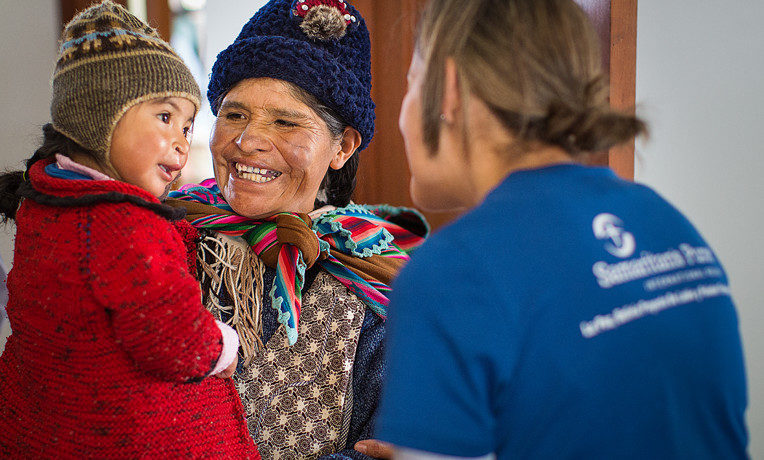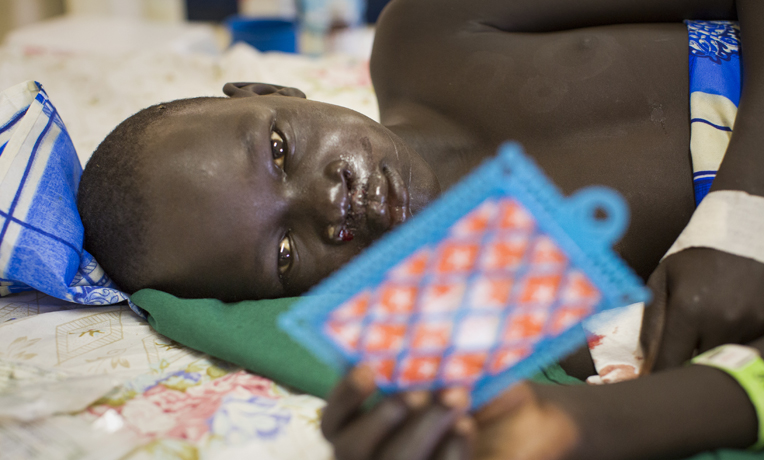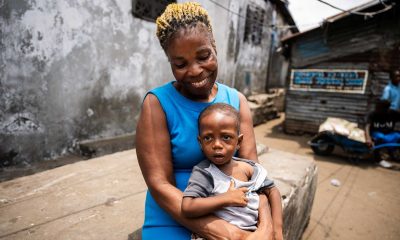Understanding the significance of cleft lip surgeries in the world’s youngest nation
Randy Bishop is a senior writer for Samaritan’s Purse. He recently traveled to South Sudan to cover a medical team performing cleft lip and palate surgeries.
Living in South Sudan with a cleft lip is difficult. There are certainly health problems to deal with—difficulty eating and drinking and talking, more frequent sinus and ear infections, etc.—but the social consequences are far more traumatic. Sufferers are often mocked and called “deformed” or “ugly” to their faces. They’re feared and associated with evil omens. Most neighbors shun them.
It’s not an exaggeration to say that each of the 56 cleft lip and palate surgeries performed in country by a Samaritan’s Purse medical team last month was life-altering. I was inspired just being there, watching in Ward 9 of the Juba Teaching Hospital as so many were blessed freely in the Name of Christ.
READ MORE about the more than 50 people who received cleft lip surgery in early November

Mary’s husband, Julius, works in Juba and heard about the Samaritan’s Purse cleft lip program through his church. When Mary learned the dates of the operations from him, she brought their daughter Juru to have life-changing surgery.
It was amazing to see patients—whether infants, children, teens, or adults— transformed by an operation that takes only about an hour (in most cases) but can make a huge difference in their lives for decades to come.
“They get to go home to their village, and they can show their face without shame,” said nurse Shannon Kyle, a veteran participant in the program. “They don’t have to hide in their tent or their hut.”
With a repaired lip, these patients should have a life of schooling, friends, and opportunities ahead of them.
“It Must Not Be Fixed”
However, there was something that bothered me a great deal through the week. From the beginning, I heard some mothers say that people back home, even friends and family, discouraged them from coming for their child’s surgery. These naysayers told them, “This is God’s will, and it must not be fixed.”
I wondered how people could believe that, especially since many people in South Sudan are Christians. Why would anyone not welcome an opportunity for healing, especially if surgery and transportation are provided free of charge?

Samaritans’ Purse flew Shiana, a refugee from the Nuba Mountains living in Yida camp, to Juba for surgery. Her former name means bad/useless/ugly, but she was given the name Mary by our chaplains.
I kept rolling these questions around in my head. I assumed the people knew and were referencing the God of the Bible. I assumed they embraced some sort of twisted theology that denied the gifts He has given to us in talented physicians and modern medicine.
But at the end of the week, after talking with one of our nurses and one of our local chaplains, I began to think a little differently. My translators had not necessarily meant the Christian God when they translated “god,” and people, especially in non-Western countries, often communicate in less-than-direct ways. I was stumbling over the literal without seeking the heart of the matter.
I discovered that the “god” I was hearing about was often not the Christian God at all. Many of the patients who came in for surgery were coming from remote places still under the grip of traditional African religions. So when they said it was god’s will, they really meant that they thought the cleft lip came from a demon and they were afraid or that their local god had given the cleft lip and that going against the local god would put them at risk.
Regardless of whether the god referred to was the Christian God—and sometimes it was—the people were using the “divine will” as a way to hide their real feelings. This was the first time many of these families had ever been on a plane, been to the capital, or had any contact with modern surgery.
Their discouraging relatives may have been trying to say they were afraid or that there was no reason to get their hopes up. In a country beaten down by five decades of violence and poverty—which has led to a lack of education, medical care, and theological training—such fatalistic thinking isn’t surprising.

Samaritan’s Purse aviation plays a key role in transporting many of the cleft lip patients from remote areas to Juba for surgery. For most patients and their caretakers, it’s the first time they’ve ever been on a plane.
Christ’s Power at Work
With these new insights, I came to some significant realizations about the program I’d just witnessed. Anyone who shows up for our surgeries is either a courageous person or was brought by a courageous person. It’s hard to take a step of faith and trust that you or your child can be healed by a group of medical volunteers from faraway places, especially if you’ve never seen an operation before.
For some, who face “don’t-fix-it” opposition from their community, their bravery is even more remarkable. It’s truly rare that someone in South Sudan would dare go against the thinking of her community.
“I always have such admiration for the families who stand up against that [thinking], especially the mothers,” said Karen Daniels, program manager for the cleft lip and palate surgery program. “If people come to me with the argument ‘God made them that way,’ I always fire back and say, ‘God made them that way and God made me to be able to fix it, so what are you going to do about that?’”
My second realization was that these surgeries are about far more than giving a child or adult a new smile. These operations are even bigger than just giving people better health and a chance to find their place in society. They’re an opportunity to point patients to the God of all hope and healing.
“We have an opportunity to minister to the patients and caretakers—an opportunity to lead them to Christ,” said Pastor Robert, one of the local chaplains with whom Samaritan’s Purse partners. “Medicine is a powerful tool to reach the people.”

The Samaritan’s Purse medical team stops to pray before the start of another busy day of surgeries.

North Carolina pediatrician Dr. Cody Carpenter supports 8-year-old Yohannes following his surgery. The boy had been treated cruelly by other children all his life, but looks forward to a better future: “When I appear before them, they will think I’m a nice person and will never more abuse me.”
Beneficiaries understand that Samaritan’s Purse is acting under the banner of Christ, and local chaplains are faithful to share the Gospel with them. The entire medical team is focused on showing the love of God in action. Every person operated on, every person treated for malaria, and every person who entered the clinic is treated with compassion and concern.
In the end, I believe many men, women, and children saw that the God we serve is more powerful than supposed evil omens, idols, or demons. One group of patients who had been worshipping local deities back home said they had no church near them. They begged our chaplains to send people to teach them about Jesus.
Others, who were Christians before they came, were strengthened in their faith in a mighty way. They acknowledged that God gave them their children and that He allowed them to be born this way. But then they saw with their own eyes His greater purpose.

Machiek Thon had been called “deformed” all his life. The day after his surgery, chaplains prayed for him and gave him a new name—Daniel.
“I never expected the baby to be healed,” said 22-year-old Charity of her 6-month-old son, Ruman. “It was like an impossibility. God also raised up people to heal, according to His will.”
Reflecting on this trip now, I see that being in Juba was a holy experience. I saw Jesus heal dozens of people through talented medical staff who call him Lord. I saw hopeless people given hope.
“And His disciples asked Him, saying, ‘Rabbi, who sinned, this man or his parents, that he was born blind?’”
Jesus answered, “Neither this man nor his parents sinned, but that the works of God should be revealed in him. I must work the works of Him who sent me while it is day; the night is coming, when no one can work. As long as I am in the world, I am the light of the world,” (John 9:2-5, NKJV).







